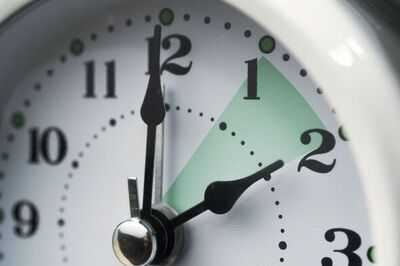A sleep expert has warned Britons to prepare to feel "tired and restless" this weekend - as the clocks going back an hour plays havoc with our body. Research from Mecca Games reveals more than half of us feel groggy the day after the clocks change at 2am on Sunday, while many also report dips in mood and energy as darker mornings set in.
Now GP and TikTok medical influencer Dr Tim Mercer has revealed why the clocks changing throws our own body clocks off balance too - despite us getting an extra hour's sleep. Dr Mercer said: "The clocks might change by an hour, but your body clock doesn't adjust that fast. It's why so many people feel tired, restless or low in mood for a few days after, even with the 'extra' sleep.
"Even a one-hour change can feel like jet lag because our body clock runs on light, not numbers.
"We're finely tuned to sunrise and sunset, and when that pattern shifts, our hormones, such as melatonin, fall out of sync with the new schedule. That's why people often feel tired, low in mood, or restless for a few days.
"That extra hour can actually make you feel worse rather than better. When we sleep longer than usual, we can drift into a deeper stage of sleep and wake up at the wrong point in the cycle.
"This causes sleep inertia: the groggy, heavy-headed feeling that comes from waking out of deep sleep instead of light or dream (REM) sleep.
"Another factor is cortisol, a hormone that naturally peaks just before we wake to give us energy for the day. If you sleep past that surge, you wake on the downslope and feel flatter and less alert than usual. Keeping to your usual wake time helps your body stay in rhythm and avoids that sluggish start.
"The good news is that our body clock is adaptable, and getting morning light, staying active, and keeping regular meal times will help it settle again within a few days.
Stressing it is all about preparation, Dr Mercer adds: "Start preparing around a week before the clocks go back. Gradually move your bedtime later by about 15 minutes a night so your body clock adjusts before the change.
"But rather than sticking to a strict time, it's better to notice when you naturally start feeling sleepy: yawning, rubbing your eyes, or losing focus... and use that as your cue to begin winding down.
"A simple, consistent routine like making tea or tidying up before bed helps signal to your brain that it's time for rest."

Over two-fifths (45 percent) of Britons claim the clock change negatively affects their sleep quality, despite technically gaining an extra hour in bed.
Giving his tip on sleep Dr Mercer said: "The one thing you should do is get up at your usual time and don't be tempted to lie in. That morning light exposure helps reset your body clock and stops that groggy, jet-lagged feeling.
"Your brain uses cues like daylight and movement, what we call 'zeitgebers', to anchor your circadian rhythm. If you stay in bed too long, you can actually feel more sluggish because your body clock drifts out of sync."
Over a third (37 percent) say it takes them over a day to readjust to the change, while one in seven take a week or more.
Fatigue is the main issue, followed by trouble sleeping and loss of motivation, highlighting how the time shift affects both energy and mindset.
More than half (55 percent) of us feel noticeably more tired or groggy the day after the clock change, suggesting that even a small time shift throws off the body's rhythm.
And most Britons feel that their mood worsens when the clocks go back, highlighting how shorter daylight hours can impact emotions.
Dr Mercer explains: "The autumn clock change tends to be harder on our health than the spring one.
"We gain an hour in bed, but we lose evening light, and for many people, that marks the first week of leaving work in darkness. That sudden drop in daylight exposure can lower mood and motivation, making us feel flat or 'wintery'.
"Sunlight also plays a key role in regulating our body clock and energy levels, so even though the angle of the sun isn't strong enough now for vitamin D production (don't forget to keep taking your supplement!), getting outside in daylight still helps.
"The spring change has the opposite effect, giving us brighter evenings that lift energy, encourage exercise and socialising, and naturally boost our mood."
You may also like

BJP appoints Vasundhara Raje's son Dushyant Singh as poll incharge for Anta bye-election

Five new K-dramas to watch this week on OTT starring Kang Tae Oh, Choi Woo-shik, Lee Jun-ho: Typhoon Family to Moon River to Would You Marry Me

Meet the man who paid £2.5m to drive Oscar Piastri's McLaren F1 car at a Grand Prix

Couple horrified by 'dog food' at hotel before 'disgusting' pool discovery

Russian aerial attack on Kyiv kills one, injures 10, officials say







